Attention on bridge! Overthinking It’s Star Trek: Discovery recaps are back for the second EVIL half of season 1 (read our previous recaps here). EVIL Mark Lee (with a resplendent goatee and metal breastplate) is now in the Captain’s chair.
The Meta-Mirror Universe
Our suspicions from the end of Episode 9 have been confirmed: the Discovery has spore-jumped into the Mirror Universe, where the Federation is EVIL and alternate, EVIL versions of characters will either be impersonated or met in super awkward face-to-face encounters. We’ll probably get some of the latter if the Discovery hangs out in this universe for much longer, but for now, we’ll have to be content with the former, most notably Cadet Tilly’s transformation into EVIL Captain KILLY with awesome battle armor and a punk rock haircut.
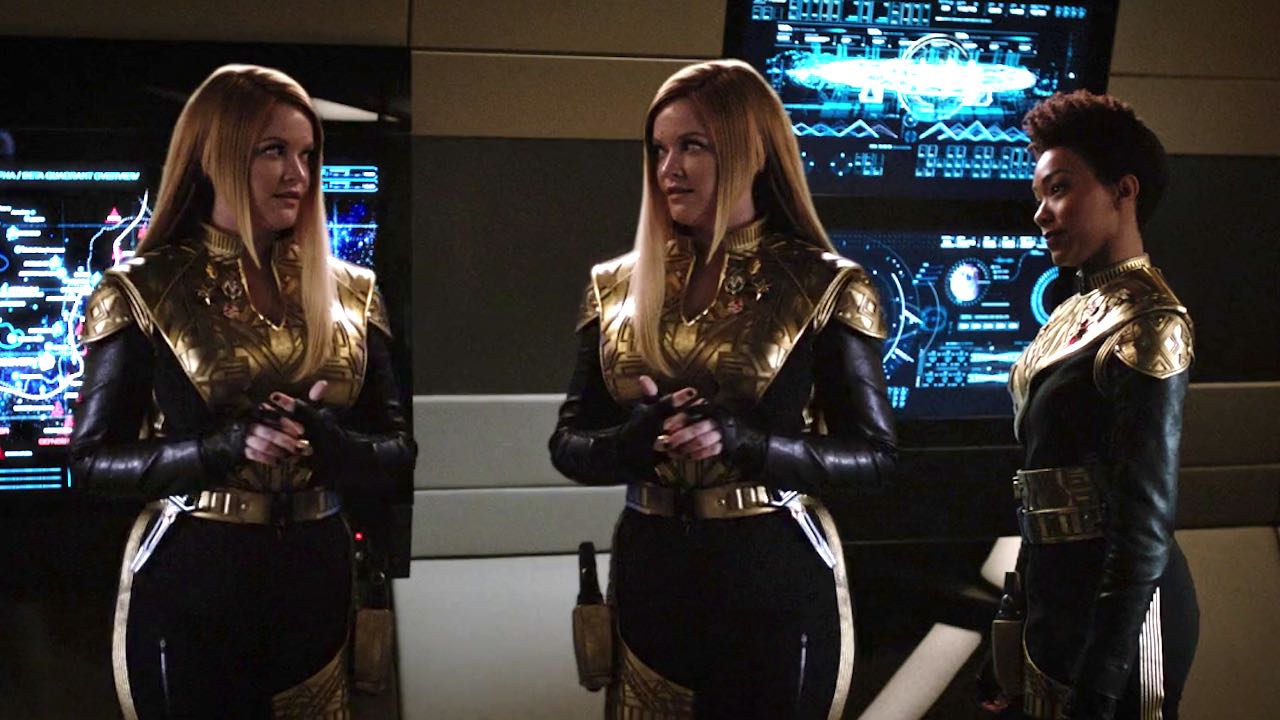
Can they keep these outfits after they escape the Mirror Universe? Please?
I’m really looking forward to all of the storytelling opportunities that Captain KILLY opens up, but let’s stay with this idea of alternate universes. See, the show ostensibly presents us with two universes: the in-show prime universe and the in-show mirror universe. Complicated enough, but nothing we Star Trek fans haven’t seen before. I would argue, however, that BOTH of these universes are again split into two by Lorca, who at the end of the last episode was shown to be hiding his true EVIL intentions from the crew, which they still appear to be unaware of, even though they’ve crossed over into his realm. Which means that THERE! ARE! FOUR! UNIVERSES! IN! A! WAY!
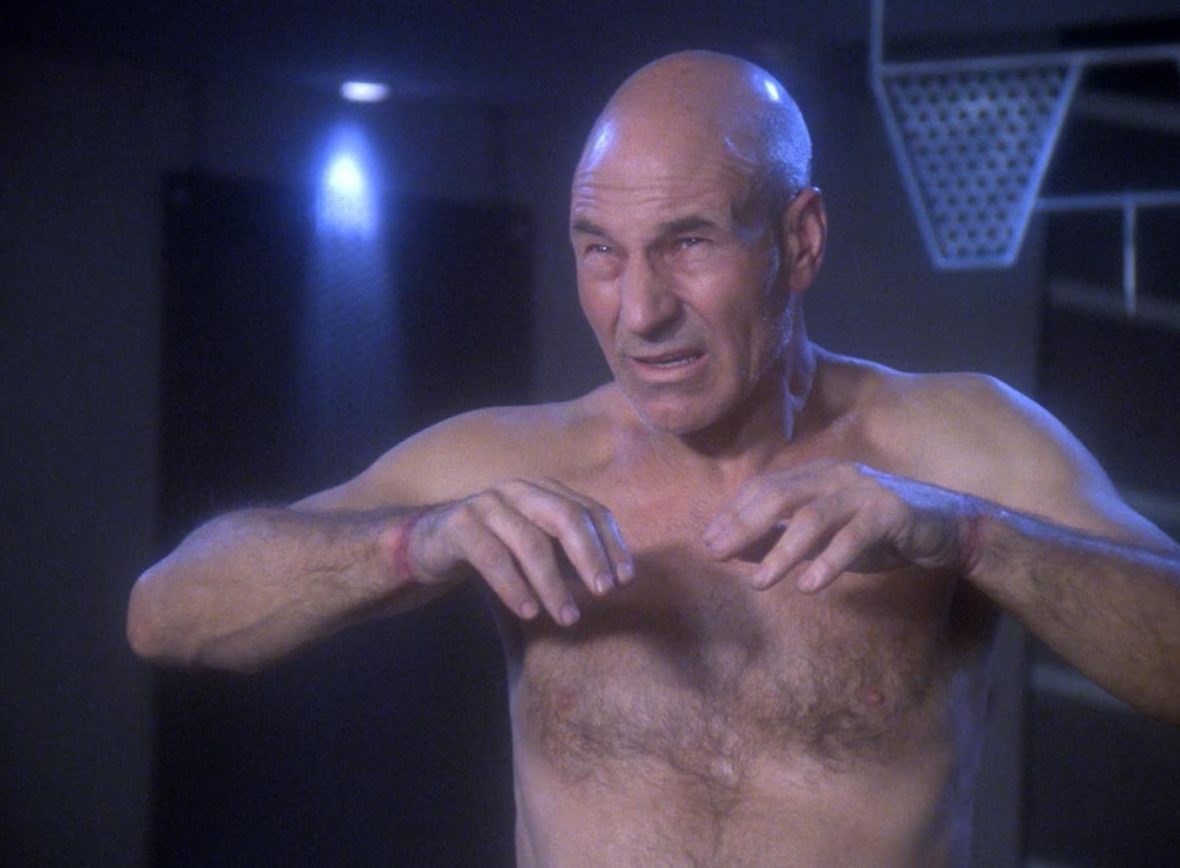
This reference NEVER! GETS! OLD!
Heck, we may actually have FIVE universes on our hands: the fifth would be the show-runners’ universe, the only one where cause-and-effect is really at play and characters’ actions can be evaluated in their complete context.
I get what the show is trying to accomplish with all of this complexity: it’s trying to extend the theme of “Discovery” as widely as possible. Within the universe, the crew discovers a new propulsion system, a mirror universe, their own capabilities, and, eventually, Lorca’s true intensions. We, the audience, discover the narrative along the way, and with it, a new type of Trek show, one that can’t be fully appreciated on a narrative level without your full, undivided attention (not to mention continuing, recurring CBS All Access subscription fees).
But, oy vey with all of these universes! This constant discovery of the unknown comes with a healthy dose of disorientation for the audience. Hence all of the critical and fan griping, on this site and elsewhere. Star Trek: Discovery shows no signs of returning to an easier status quo any time soon, so expect the griping to continue until we either come to terms with the universes’ new realities or give up and jump ship to the Orville.
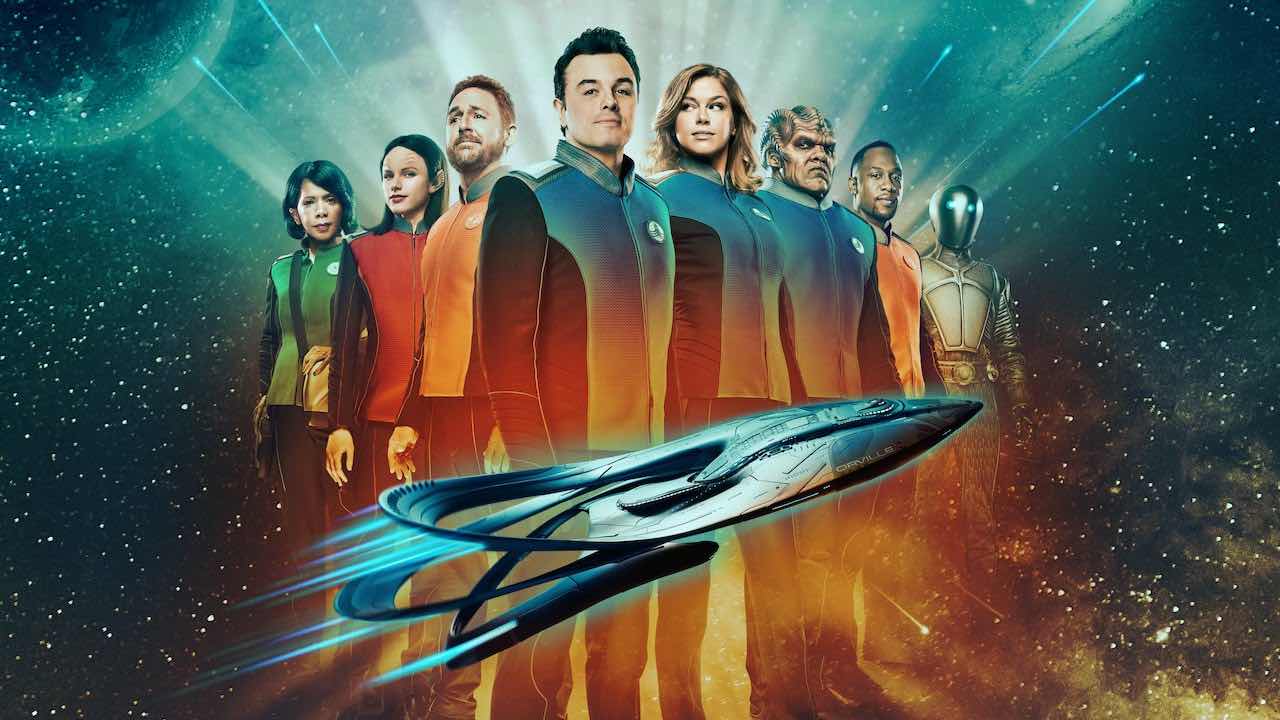
A sixth universe, in a way.
How Do You Say, “I, too, have a secret plan” in Klingon?
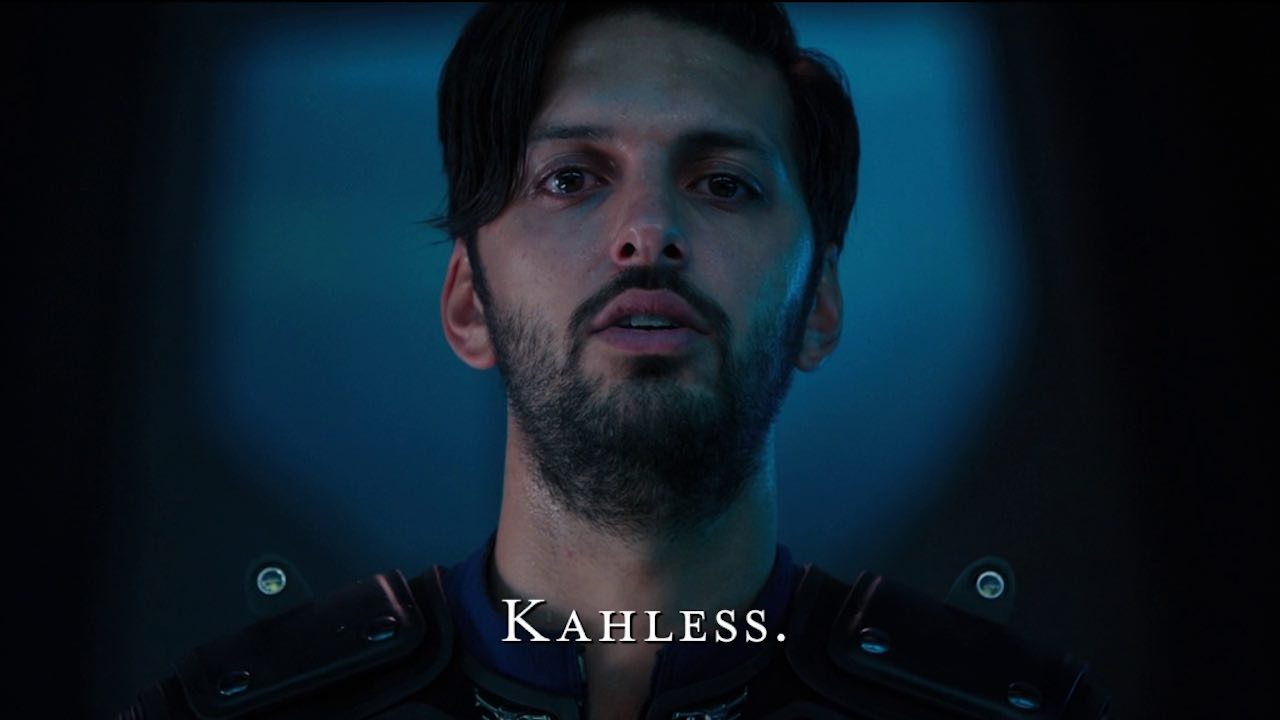
While the crew comes to terms with the Mirror Universe, Ash Tyler’s Klingon controller (kontroller?), L’Rell, succeeds in activating the surgically implanted Voq personality within Tyler. We don’t really know what the long game is for L’Rell, seeing as she was brought aboard the Discovery before it entered the Mirror Universe, so we’re left with learning more about this situation a the surface level: Ash is still traumatized by the whole thing, and though he may have showed some resistance to L’Rell’s commands at one point, later he brutally murders Dr. Hugh out of his Klingon sense of self-preservation. He then joins Burnham and Lorca on their trip to the EVIL Shenzhou, where he’s given the delicate task of helping maintain Burnham’s EVIL cover. They have sexy times to relieve the tension of pretending to be EVIL all of the time.
What could possibly go wrong? So, so much. Tyler has enough psychosexual horror to last himself (and the Klingon inside him) for a lifetime, and all signs indicate that he’ll share it with Burnham, who, if you recall, is super emotionally repressed (on account of her Vulcan upbringing) and is probably not going to handle this complication to intimacy well.
Again, on the theme of discovery: this degree of psychosexual terror and pain is uncharted territory for Trek. The blood-and-guts surgery/rape scenes and Tyler’s ensuing anguish seem more at home in an Alien movie rather than a Trek TV show. If the show’s goal is to get us out of our comfort zones and discover new, horrible feelings that we previously didn’t associate with Trek, then it’s succeeding in spades in this regards.
(Side note: Star Trek: Discovery keeps with Trek tradition in that it is not at all about about invasive surveillance, even though the technology would clearly allow for it. Even in the brig–the one place on the ship where you’d expect the computer to be watching and listening to everything–the characters are able to have a private interaction and keep it secret from the rest of the crew. Part of me wishes that Trek would stretch its speculative sci-fi muscles in this area more, but part me of is also glad that Trek is Trek and not Black Mirror.)
Stamets and Hugh Had Better Get Their La Boheme Moment
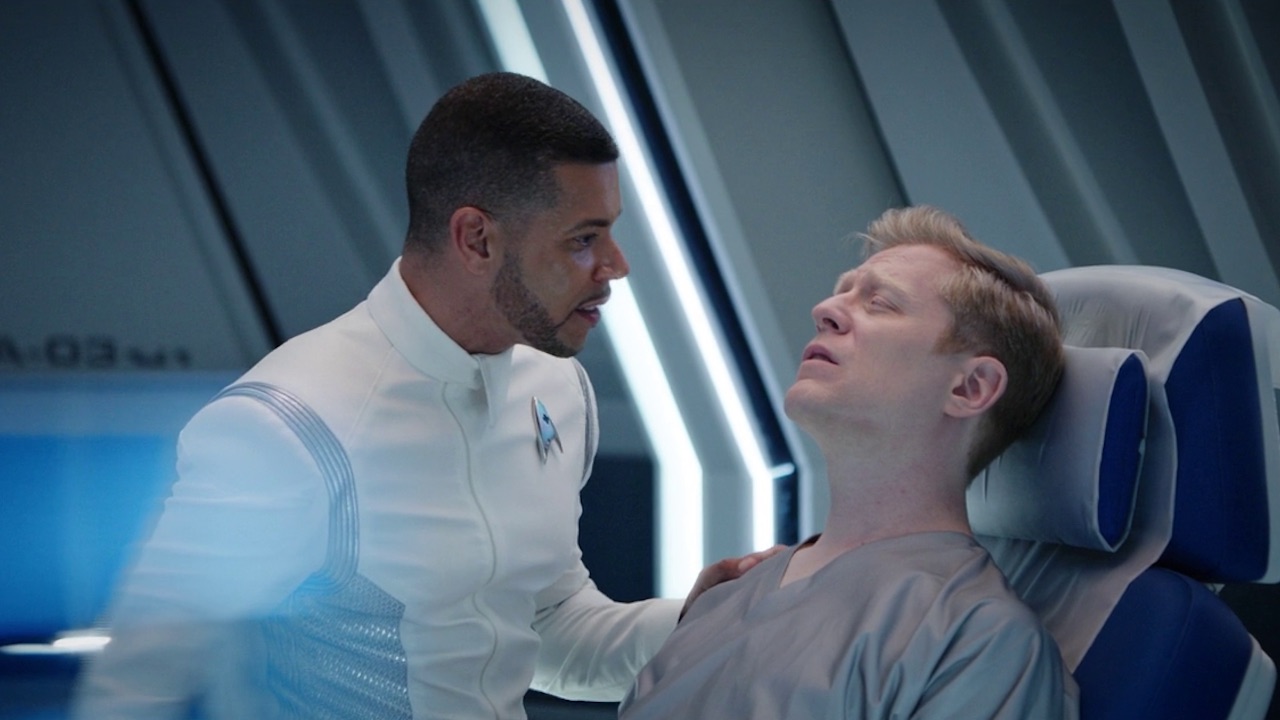
Stamets appears to be the only person inhabiting all five of these universes, including that of the show-runners. Several episodes ago, he had a vision of Tilly as captain, and in this episode, he recognizes that Tyler has been compromised. Again, in keeping with the theme, he spends most of the episode in a trance-like state with cloudy eyeballs, depriving the audience not only of information but also of quality time with his character.
And speaking of depriving the audience of quality time with enjoyable characters, his poor boyfriend, Dr. Hugh, gets Klingon neck-snapped by Tyler! It’s in keeping with the theme–and also infuriating–that the audience has now been deprived of the only straightforward romantic relationship on this show. At least, for now: all signs point to his character coming back in some form, so at least he’s alive in the show-runners universe. But not ours, dammit!
I told you there’d be gripes!
Boldly Discovering
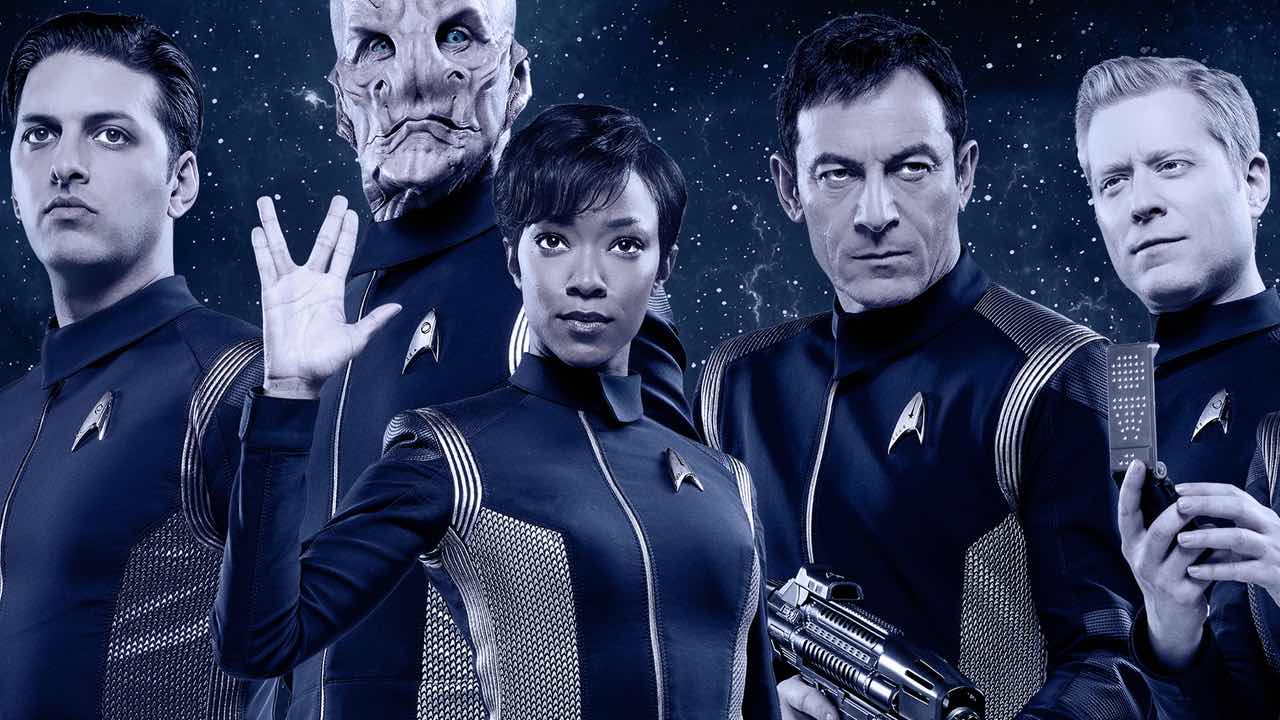
One of these characters needs to die.
In spite of my gripes, I am still on board with this show and am open to seeing where all of this leads, in hopes that at least some of these loose ends get tied up by the end of the season and that Lorca gets his just desserts eventually, because he is such a gigantic asshole. But mostly, I’ve also come to terms with the fact that Trek has moved past the TNG ideal of my youth and that I should open myself up to the spirit of discovery that this show embodies.
Course setting, my friends?
Second star to the right, and straight on ’till next month’s CBS All Access renewal.
Could you expand a little on what the five universes are? I’m unclear how Lorca splits each in two – are you suggesting he’s from neither the prime universe nor the mirror universe but some alternate to both of those (which would then have an alt-prime and alt-mirror counterpart)? Or are you defining universe as something related to perception, so there’s the prime and mirror universes as Lorca perceives them, as well as a prime and mirror universe that the rest of the crew sees, etc.? Or am I completely off base from your argument?
“Or are you defining universe as something related to perception, so there’s the prime and mirror universes as Lorca perceives them, as well as a prime and mirror universe that the rest of the crew sees, etc.?”
Basically this. I admit it’s a bit of a stretch for rhetorical effect, but my broader point is basically that there are 5 different POVs on “what is really going on right now” and that’s way way more than what we’re used to for any tv show, to say nothing of Trek.
In that case, I think you could further fracture the narrative through Tyler/Voq’s perception as well given his split loyalties and split personalities. Possibly even L’Rell’s, who already sees the prime-Discovery’s crew as the enemy – what would she think of mirror Discovery?
This show is all-in with Buffy-style serialization: long-term plot and character arcs complicated by the Gimmick Of The Week.
Do we think that Tyler is Tyler with a little Voq voice inside or–based on Culber’s talk of “overlaying” personalities, shortening limbs, and so forth–Voq papered over with Tyler’s memories? The latter makes no sense in our universe, but I believe that the franchise has at least a couple of incidents suggesting that even superficial genetic identification is either broken or unused (keeping with the theme of surveillance nobody bothers with), and it wouldn’t diminish the handling of Tyler’s PTSD if that was all lifted from the original Tyler. Plus, added angst for Michael, who’s not overly-fond of Klingons.
But I’m much more interested in how Culber comes back. There’s obviously the counterpart out there, but also Stamets’s time-slipperiness and the quirky possibility of the multiversal mycellium flowering up a Hugh mushroom. Since a lot of the background to the series is obviously “Mycellium Running” (I read it when it came out…), the last wouldn’t surprise me, though I don’t know how satisfying it’d be.
Getting back to the surveillance, though, I wonder whether it really is unused. From the beginning, Star Trek has hinted at the Federation’s dark corners, from the drugs and (bluntly) sex-trafficking in “Mudd’s Women” to the zealous racism and possible coups that rear their heads during The Next Generation to Deep Space Nine’s Section 31 to the enslavement of holograms during Voyager to…most things that happen on Enterprise. A hallmark of the franchise (like any society, maybe) is for everybody to pretend they don’t notice these things and soldier on, but nobody in the twenty-fourth century so much as blinks before asking the computer for everyone’s exact location, and nobody ever complains about privacy. Maybe surveillance is so pervasive that they don’t even think to use it, even while rogue holodeck programs use it to quietly bump off their victims or whatnot…
I’d be interested to see if there will ever be a Star Trek franchise set in the civilian world. It’s kind of difficult, based on Star Trek TV shows/movies/books, to get much of a bead on what life is like for the average Federation Citizen. Re: continuous surveillance I’ve always had the sense that some aspects of the whole “computer knows where you are at all times” element comes down to the Starfleet members consenting to be part of a pseduo-military command structure where your commanding officer has the right to know your whereabouts any time you’re on their ship.
Absolutely. Or, rather, not necessarily “day in the life” (we’ve seen glimpses of that, like the visits to Sisko’s father’s restaurant during the Dominion War), but rather something like a company or civilian police department, where the widespread technology would be something to use to drive the plot, rather than just a part of life that’s been around for so long nobody remembers otherwise.
(The big episode that makes me think things are pretty bad in the Federation, though, is TNG’s “The Drumhead,” where we’re introduced to that crewman who hid his Romulan heritage on his Academy application and, presumably, his and a parent’s entire life. The focus is on how bad the investigator is, but he wasn’t hiding from her.)
I think that the Dominion War stuff on earth in DS9 supports An Inside Joke’s argument. After all, a lot of those episodes talk about “protecting paradise” and the president is reluctant to pull back civil rights even in the face of the the changeling threat.
The TNG era (especially DS9) was concerned with what it takes and what’s appropriate and moral, etc for a society to both protect itself and uphold its ideals, but almost entirely within starfleet itself. I think to really drive home the whole protecting utopia thing they wanted to stay away from anything close to a surveillance state to assure that what Picard and, especially, Sisko are fighting to protect is, in fact, “paradise.” (Janeway, of course, barely dealt with earth so this argument isn’t as applicable to Voyager)
Of course, Discovery clearly has no such project and Lorca seems to have had his “pale moonlight” moment way before this show. So it is slightly odd that they don’t get into it, because it seems like the one Trek show that would get into it.
My read on it is that this show and earlier Trek shows are interested in doing two very different things. This show seems to want to just play out a serial adventure story within the Trek universe(s). So I think we shouldn’t be surprise at its disinterest in exploring the wider ramifications of its plot and character points. TNG era Trek used its mcguffins and technobabble in order to create philosophical/allegorical discussions. Personally, I think that’s what makes those shows so unique. Disco seems to be a much more normal show in that the story always comes first, so mcguffins and technobabble exist solely to drive either plot or character in whatever direction they wish to drive it. I think that’s what makes Disco feel different from other Trek shows, especially from TNG (in which most episodes seem to start from the desire to explore some “big questions” and then go from there).